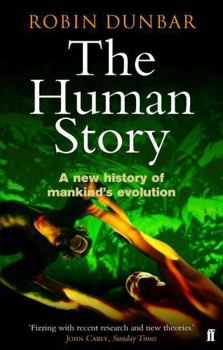The Human Story: A New History of Mankind's Evolution. Robin Dunbar
Select Format
Select Condition 
Book Overview
An account of the latest thinking on human evolution, by ?one of the most respected evolutionary psychologists in Britain'. For scientists studying evolution, the past decade has seen astonishing... This description may be from another edition of this product.
Format:Paperback
Language:English
ISBN:0571223036
ISBN13:9780571223039
Release Date:January 2005
Publisher:Faber & Faber
Length:216 Pages
Weight:0.35 lbs.
Customer Reviews
1 rating
Digging up roots
Published by Thriftbooks.com User , 19 years ago
According to Dunbar, our "Story" can only be told as a family record. Unless we better understand our relations we will never properly understand ourselves. His sweeping examination of various aspects of the living world shows us we have a special place, but not a unique one. Living creatures have many shared aspects of their lives. We need to study them more closely. The investigation, however, must be a more penetrating view than we've too often used in the past. The distinctions in behaviour in our nearest cousins in cages and in the wild are an indication of the needed effort. How much of our training chimpanzees is actually their manipulation of us? 'What is their intention compared to ours?' is a major theme. Dunbar's writing is far from the pedant's academic style - further enlivened by some graphic examples and a few charts. Although most of this work is recounting research studies in field and laboratory, his descriptions of behaviour leave you feeling you've been watching with the observer. In setting each topic theme, he opens the chapter with a scenario from the past. One of our ancestors is participating in cave painting, preparing for the hunt or communing with spirits. These are events comprising the roots of our cultures. The author shows how our construction of cultures resulted from a more complex [NOT "higher"] reasoning prowess. The complexity arises in our capacity to build and unravel "levels" of intentionality. From an individual's intention to act Dunbar takes us through the various levels to show how Shakespeare [to cite but one example] intended his audiences to comprehend the intentions of his various interacting characters. Although it is fairly common for humans to achieve five levels of intentionality, reaching the sixth is more than just a mental chore. Dunbar admits his attempt to surpass that grade ended in futility accompanied by an empty whisky bottle. Even so, the fifth and sixth levels are what set us apart from our primate relations. This cognitive ability, coupled with our physiology, is what granted us speech - an unshared trait. Dunbar spends some time examining speech. The dispute over what constitutes "language" has been long and sometimes acrimonious. Unsurprisingly, he doesn't fully resolve the question, but provides sufficient detail to help the reader understand the issues. When, for example, do simple, silent gestures become a form of language? Dunbar has previously discussed the role of grooming in building communications abilities and expands on those ideas here. As a concluding note, Dunbar examines the issue of religion - another aspect setting us apart from the other animals. Events, communicated to others, often leads to questioning cause. When the cause of an event cannot be identified, it becomes attributed to the supernatural and religion is born. So long as enough people communicate a common cause for events, religion becomes a cohesion factor in society -





